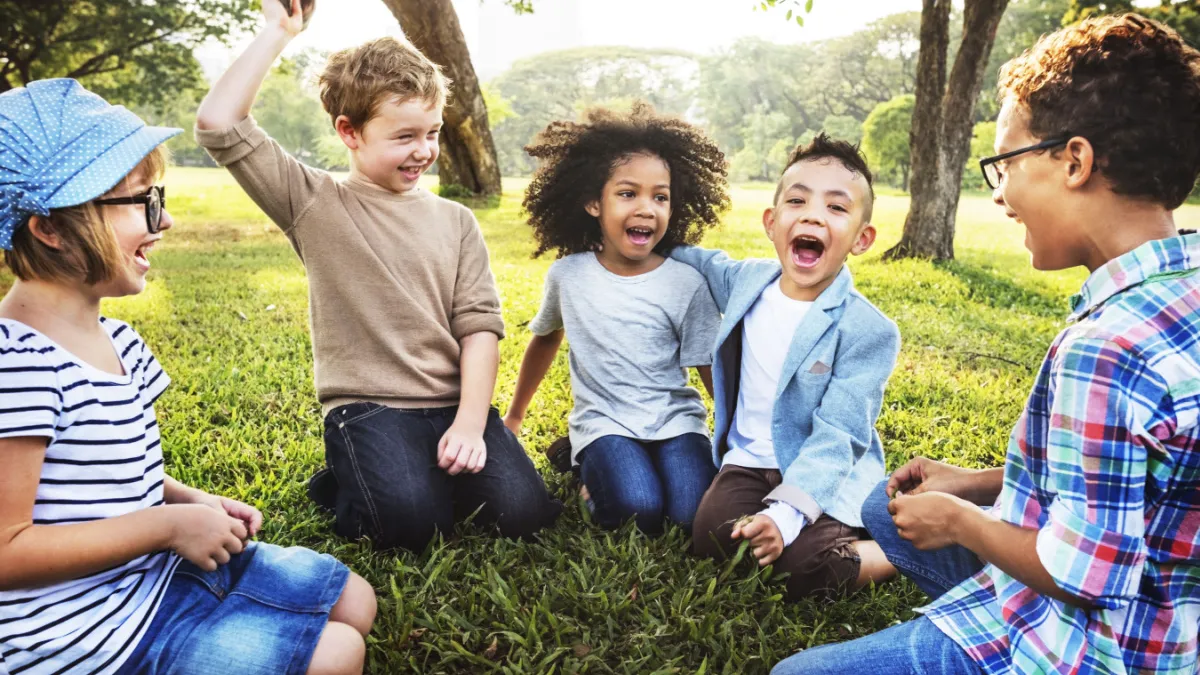Childhood is a complex developmental stage that has an immense impact on lifelong development and wellbeing, and happiness in children is dependent on a complex interplay of factors in their environment and upbringing. Knowing what helps children to be happy can guide parents, carers and educators in creating positive nurturing environments that support a sense of joy in childhood and lifelong mental health. Here are six recurring themes that are common in happy children, and how to help to ensure they are present in everyday life.
Supportive Family Environment
A family that supports the child is one of the most important factors contributing to the happiness of the child. The family that encourages the children to be a useful member of the household always contributes to making that child happy. The children are the happiness of their parents and their families. If the child feels the warmness of their family members around them, this will lay the foundation for a happy life.
When young people feel that their parents always support them and are happy with them, their self-esteem and enthusiasm increase. These advantages help them cope with various difficulties in life. When parents pay attention to their children’s emotions and conversations and talk to them about it in a positive way, this will build the relationship, and the child will always trust their parents. These conversations convey to the child that the parents always support them. In addition to some specific conversations, discussions of daily routines, such as preparing for bed and waking up, and the order of meals, help the child develop a habit and routine, which is an essential part of emotional development.
Children learn by following the lead of their parents and guardians. Parents and guardians set an example by using healthy coping mechanisms to manage stress and have positive interactions. Children will be more like their parents than anyone else they know; for this reason, parents must model healthy behaviour. Family activities, whether they be shared meals, weekly game nights or biking around the neighbourhood together, stay shared and create positive memories that keep the family, and thus each individual family member, together. Family activities bring joy and are foundational for children to have a strong support system that increases their overall happiness.
Opportunities for Play and Creativity
Play is not some super added-on leisure activity, it is a fundamental element of child development and happiness. Through play, children learn to discover the world, make friends and learn express themselves. Happy children are often those who have a chance to play in large quantities and in a wide variety of ways – structured play and unstructured play. Unstructured play is the free play opportunities that involve the freedom to play with their friends and they will often create their own rules, using their imagination and problem-solving skills. On the other hand, children also need the opportunity to engage in more structured play, such as organised sports or artistic activities, where they will learn about discipline and teamwork, and setting goals.
Activities such as drawing, painting, building, playing instruments, storytelling, and acting help them convey their emotions and ideas to their parents and peers. Creative activities also help children explore and expand their creativity, cognitive and emotional abilities while at the same time providing them with precious moments of pride and joy. When parents or educators engage in these activities together, this only adds to the child’s confidence and joy. Nurturing a child’s happiness means providing him or her with different kinds of play and creative opportunities.
Positive Peer Relationships
Children’s happiness is greatly linked to their social lives at a young age. Having happy relationships with peers gives children someone to enjoy time with and it can provide them with support and a sense of belonging. Generally, happy children have at least one friend who shares a similar interest or is willing to learn. Moreover, it is during early childhood that a child will learn vital social skills. Making friends requires children to cooperate, communicate and respond with empathy. These are all things that all children will need to learn and use in their lifetime. Additionally, as children learn how to befriend others and work as part of a team, they soon learn how to settle differences among peers. Playing in groups, and especially in teams, will also teach children about rules and how to follow them.
Promote a healthy social environment. Expand children’s circle of friends by encouraging them to engage in group activities and by facilitating friendship opportunities. Role model and teach children how to be respectful, and provide guidance and support as they navigate the social world. Try to address bullying or exclusivity promptly, before it becomes a problem. When children feel that they are liked and valued by their peers, this can add greatly to their lasting happiness and self-worth.
Balanced Nutrition and Physical Activity
Balanced foods and exercises are crucial for the body health in childhood which directly affects children’s happiness.
After consuming the right amounts of foods, children can get the energy and nutrition for good growth and development. Nutritious food will not only provide sufficient energy and nutrients for good health and development, but also will have lasting effect in maintaining good cognitive function and emotional stability.
Contrastively, lack of proper nutrition will show adverse effects on overall well-being of children in the short term. Thereby, children will feel tired, irritable, and have poor concentration.
Regular exercises are equally as important as nutrition in the child’s happiness. Frequent exercises can help the child to develop powerful muscles and bones, enhance the cardio ventricular system, and also brighten their mood and reduce the feeling of depression by releasing natural hormones that make one feel good. Playing football outside and riding a bicycle or any activities that include movements will release endorphines, which are the natural happy hormones in the body. To ensure the happiness of the child doesn’t end with the endorphines, parents must encourage their children to partake in exercises that they enjoy doing more often so they can develop a healthy and positive attitude towards fitness and being healthy. Nutritious meals paired with regular exercises create healthy lifestyles for the happiness and good health of a child.
Safe and Stimulating Learning Environment
An unthreatening learning environment is important for the intellectual and emotional development of a child. Children are known for their curiosity and it is crucial for them to have access to a stimulating learning environment. Schools and homes, that provide learning opportunities tailored to developments, interest, and styles of learning of a child, helps them to excel in their developmental learning process.
An environment that is stimulating for a child will have books, educational games, any creative material that helps them learn easily, also hands on learning opportunities to learn through field trips and the like.
One such crucial condition is safety. When children feel physically and emotionally secure, they are more likely to develop a love for learning and exploring. To feel safe and secure, children need to experience physical safety, by having homes that are child-proof and play places that are safe; and emotional safety, by having and expressing themselves around people who support and love them, and who do not judge or punish them for doing so. It is the educator’s and the parent’s responsibility to try to create such spaces. In general, providing such an environment fosters a love of learning, and remains one of the foundational components of a happy childhood experience.
Emotional Support and Guidance
Although too much positive regard can enable a teen and imbue them with an inflated sense of self-worth and importance, emotional support and direction from parents, teachers and other caregivers are essential for a child’s sense of wellbeing. That capsicum-eating child must know that they can count on an adult – a trusted and familiar one – to help make sense of, and cope with, the challenges they face. That child must feel understood and be heard to develop empathy and resilience – the ability to face obstacles and muddle through emotions skillfully.
Parental and other adults’ advice also includes sharing with the children how to process their emotions, how to work through difficulties, how to get back on their feet when they feel frustrated, how to cope with stress and failures, how to bring up their concerns and how to express their feelings in healthy ways, which will all contribute to building stamina and bolster a child’s emotional wellbeing. Teaching kids mindful and relaxation skills such as controlled breathing is essential. Fostering open dialogue and sharing one’s feelings in healthy terms are precursor steps in developing healthy coping skills. With the support and guidance from the adults in the child’s environment as well as through engaging in physical activities, interacting with friends and family, and being involved with constructive and meaningful activities, children are more likely build a solid foundation for a happy future.
Conclusion
There isn’t one magic bullet for helping children have happy lives. Happiness for children is influenced by a wide range of interdependent factors including a loving family home; spaces to play and be creative, positive relations with peers and pets; healthy nutrition and physical activity; places for learning that support and engage children, and nurturing adults to help children navigate the ups and downs of life. Parents, caregivers and teachers who give children these happy elements can help children become happy, healthy and successful adults. These range of happy elements contribute to a child’s wellbeing, not just at their younger happiest levels but contribute to their being able to become happy, healthy, productive adults.




